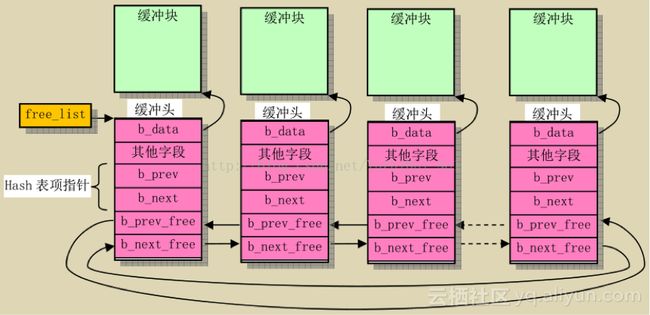Linux磁盘高速缓存
磁盘高速缓存是一种软件机制,允许系统把通常存放的磁盘上的一些数据保留在RAM中。
例如,目录项高速缓存(dentry cache),加速从文件路径名到最后一个路径分量的索引节点转换过程。Linux还有其他磁盘高速缓存,如页高速缓存、缓冲区高速缓存。
这里需要注意缓存和缓冲的差异,缓冲是buffer,缓存是cache。
2.4之前的内核中有两种缓存,一种是vfs的页高速缓存,另外一种是缓冲区高速缓存,缓冲区对应于磁盘块,是磁盘块在内存中的表示罢,其中的数据也还是文件中的数据。页高速缓存是按照页面管理的,而缓冲区高速缓存是按照块来管理的,两个缓存在数据本身上有一定的重合,这就造成了冗余.
到了2.6内核,有了bio,那么buffer_head(高速缓存使用的数据结构)再也不用作为IO容器了,一般来说,能用bio的话就用bio。现在缓冲区高速缓存是页高速缓存的一部分了。
1.1.1 页高速缓存
页高速缓存是由内存中的物理页面组成的,内容对应磁盘上的物理块。
使用的回收策略主要由LRU、双链策略(LRU/n)、
页高速缓存中的页可能包含了多个不连续的物理磁盘块。因为不连续,所以导致定位特定数据是困难的。
为了管理缓存项和页I/O操作,引入了address_space结构体。位于include/linux/fs.h文件中。
struct address_space {
struct inode *host; /* owner: inode, block_device */
struct radix_tree_root i_pages; /* cached pages */
atomic_t i_mmap_writable;/* count VM_SHARED mappings */
struct rb_root_cached i_mmap; /* tree of private and shared mappings */
struct rw_semaphore i_mmap_rwsem; /* protect tree, count, list */
/* Protected by the i_pages lock */
unsigned long nrpages; /* number of total pages */
/* number of shadow or DAX exceptional entries */
unsigned long nrexceptional;
pgoff_t writeback_index;/* writeback starts here */
const struct address_space_operations *a_ops; /* methods */
unsigned long flags; /* error bits */
spinlock_t private_lock; /* for use by the address_space */
gfp_t gfp_mask; /* implicit gfp mask for allocations */
struct list_head private_list; /* for use by the address_space */
void *private_data; /* ditto */
errseq_t wb_err;
}
和虚拟地址vm_area_struct的物理地址对等体。一个文件可以被多个进程映射到多个虚拟地址,但是在物理内存中只有一份。
操作函数表的结构体是address_space_operations。指定缓存对象实现的页I/O操作。
1.1.2 缓冲区高速缓存
独立的磁盘块通过块I/O缓冲要被存入页高速缓存。一个缓冲是一个物理磁盘块在内存里的表示。缓冲的作用是映射内存中的页面到磁盘块,使得页高速缓存在块I/O操作时减少了磁盘访问。
高速缓冲区中分两类结构,第一类是高速缓冲区头部结构主要用来索引高速缓冲块地址,第二类是高速缓存块。
缓冲头的结构体定义在文件include/linux/buffer_head.h中
在源码中可以看到其头部对齐注释如下:
/*
* Historically, a buffer_head was used to map a single block
* within a page, and of course as the unit of I/O through the
* filesystem and block layers. Nowadays the basic I/O unit
* is the bio, and buffer_heads are used for extracting block
* mappings (via a get_block_t call), for tracking state within
* a page (via a page_mapping) and for wrapping bio submission
* for backward compatibility reasons (e.g. submit_bh).
*/
2.4以前,页高速缓存和缓冲区是独立的两个磁盘缓存,前者缓存页面,后者缓存缓冲区。导致一个磁盘块会同时在两个缓存区中,浪费内存,这当然是不能接受的。现在已完成统一,只有一个页高速缓存,而缓冲则用来表示磁盘块用页映射块,包含在了页高速缓存中了。
1.1.3 刷新机制
内存中的数据早晚是要刷到磁盘的,一般由多种激发方式,具体可以查看/proc/sys/vm文件夹中相关文件,例如:
l  当空闲内存低于一个特定的阈值/proc/sys/vm/dirty_background_ratio
l  当脏页在内存中驻留时间超过一个特定的阈值, /proc/sys/vm/dirty_expire_centisecs
l  用户进程调用sync和fsync
如果系统崩溃,内存中没有刷会的脏页就会丢失,所以周期性同步页是非常重要的。
这个刷盘动作,最早是由bdflush完成,后来由pdflush。可以在系统中执行ps -ef | grep -i flush来查看。
现在也是支持多线程刷盘的。
